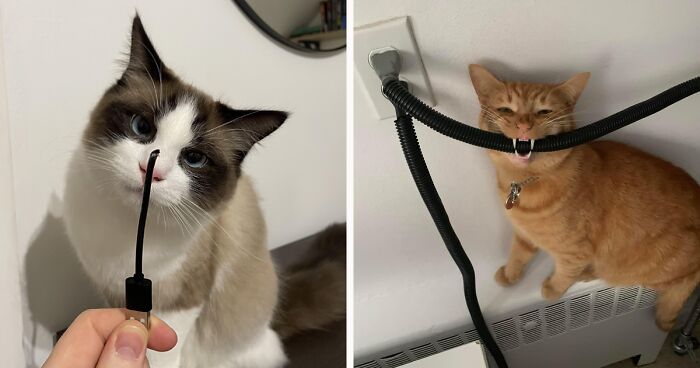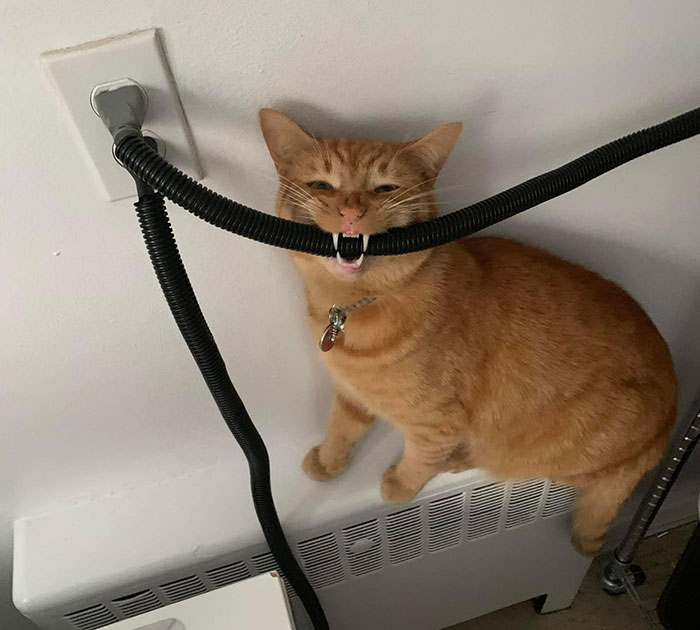Cats are curious and cheeky pets who often get into mischief when we’re not watching. One common way that they do this is by cord chewing. Nowadays, most homes have an abundance of electrical cords within their pet’s reach, including chargers and TV cables.
It is essential you stop your cat from chewing cords, as it can be incredibly dangerous and even life-threatening. If plugged into the mains, your cat could suffer complications such as chemical burns, heart or lung damage, or even death. Read on to learn how to keep your cat safe from electrical wires.
- Chewing cords can be life-threatening for cats.
- Kittens often chew to ease teething discomfort.
- Mature cats may chew less as they age.
- Cat-proof homes and offer chew toys to help.
The information provided herein is for informational purposes only. Please refer to our disclaimer for more details..
Is it normal for cats to chew on electrical cords?
Image credit: Im-StrawberryBlonde
Any cat can gnaw on cords, which is not necessarily a sign of a behavioral disorder, as it is commonly seen. They have a natural instinct to chew things, although this will not always extend to non-food items in every patient.
If your cat does it, it may indicate something amiss.
What are the reasons for chewing on cords?
The urge to chew is strongest in kittens but can also be present in adult cats. Cats may chew to ease boredom, get attention, or even ease the discomfort of teething or pain from periodontal disease. They may like how it feels on their gums, especially if the cord is excellent.
For some, the cat is chewing due to pica. This term is used to describe when cats like to lick, chew, and eat things that are not food, including cords, plastic, string, and paper bags. Pica can be linked to nutritional deficiencies, including iron deficiency, but there is not always a definitive cause.
Do cats grow out of chewing wires?
As time passes and they mature, many of our feline friends are less inclined to be mischievous and chew on things they shouldn’t. This is due to them learning from past experiences (when they were told off for chewing things they shouldn’t!) and a natural decline in curiosity and playfulness.
However, not every cat grows out of the behavior; some will keep their owners on their toes well into their senior years.
How do I stop chewing on cords?
Image credit: grackdontcrackback
Two main things need to be done. One is to ‘cat-proof’ your home and to limit any contact with cords, while the other is to reduce your cat’s desire to do so.
Cat-proofing a home is similar to child-proofing it, and we need to hide cables by corralling them out of sight and using cable covers. They should never be within reach, if possible.
We can reduce our cat’s instinct to chew cords by providing plenty of mental and physical stimulation, ensuring they are not bored. This is important for all ages, but especially kittens. Stimulation can include chasing games, scenting games, using scratching posts, and providing outdoor access.
Offer alternative chew toys, including ones that can be frozen, to satisfy your kitty’s natural desire to chew. Cats tend to chew whatever is on offer, whether it is a finger or a toy, so you can protect your cat by pre-empting this and giving them some safe options.
Cats hate certain scents and tastes, so you may also consider using a bitter-tasting spray (available from most vets and pet shops) on cords.
What is the worst thing that can happen if a cat chews on cords?
Sadly, there is a risk of your cat getting electrocuted and even passing away from cord-chewing.
There is also a real risk of your cat starting a fire and putting you, your home, and your family in danger.
Take your cat to the veterinarian immediately if you suspect they’ve chewed any cords in your home.
Do not touch them or the cord until you have turned off the power circuit, as you could get electrocuted yourself.
Treatment at the clinic can include oxygen, IV fluids, pain relief, and ant acids. If the cat has burns in its mouth, it may require some assisted feeding for several weeks as it heals.
FAQ
Are particular cat breeds likely to chew cords?
Yes, we know that Siamese and Burmese cats tend to be repeat offenders, possibly due to their naturally inquisitive personalities. However, any kitty can have a strong urge to chew and may gnaw on things like electrical cords.
Is there any medicine to stop a cat from chewing on cords?
There are prescription medications available for those with anxiety or obsessive-compulsive disorders. For some kitties, anxiolytic or anti-depressive type medicines may prove helpful. These types of medicine would generally be taken while the cat is in a behavioral program and under the care of a vet and/or behaviorist.
These cats would generally display a number of inappropriate behaviors, not just chewing electrical cords.
Are those who chew cords prone to other nuisance behaviors?
For some, yes, there will be more going on. Some kitties who chew household items like cables and rubber cords also develop issues, including overgrooming, self-mutilation, repetitive tail chasing, and aggression. This is because some cats are naturally highly strung and easily bored, meaning they may exhibit various behavioral problems.
180views
Share on Facebook
 Dark Mode
Dark Mode 

 No fees, cancel anytime
No fees, cancel anytime 




















































14
0